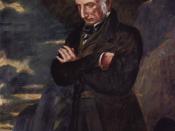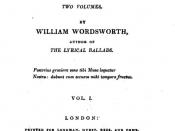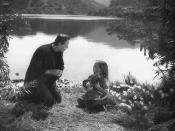Frankenstein's Romantic Failures William Wordsworth's poetic writing exemplifies romantic tones that are both reinforced and challenged in Mary Shelly's Frankenstein. Shelly's characters are emotionally charged and we are able to delve deep into their thoughts and feelings through the colorful use of language and expressive voice exhibited through out this novel. Many instances in Shelly's masterpiece reflect Wordsworth's romantic images and their effect on the people with whom these images are concerned, but the overall plot in Frankenstein sees the characters ultimately make choices that differ quite radically from that of the romantic ideals expressed in Wordsworth's poems, and we see how these choices do not create effective conclusions for these characters.
In I wandered lonely as a cloud Wordsworth embarks on a solitary journey into nature and conveys his images of the beauty of nature through romantic reason. This reason is the absolute contentment of his soul through being able to find personal contentment from nature.
He is entranced by the world around him and is excited by the very sight of glorious nature. He marvels at the way the daffodils are "fluttering and dancing in the breeze"ÃÂ and tells of how, when he is "in vacant or in pensive mood"ÃÂ he is able to recall these images of beauty that "flash upon his inward eye"ÃÂ and they fill his heart with pleasure and put him at ease (lines 6,7,8). This typifies Wordsworth's idea of the romantic sensibility; the simple pleasures of nature are able to clear his mind and create in him peace and inner calm.
This same appreciation for nature and the gifts it offers is reflected again and again in Wordsworth's poems. For example, in Lines he refers to a river as his "dearest friend,"ÃÂ highlighting the importance he places on a man-to-nature bond (line 118). He also notes, "that Nature never did betray the heart that loved her,"ÃÂ which reinforces the romantic idea that nature is a force that will not pass prejudice (line 5-6).
From Wordsworth, we can create a definition of the romantic sensibility: living life through a mutual love with nature will instill in the soul boundless contentment. Nature is the one constant that man can rely on. Victor Frankenstein is a man who lived by this sensibility for some part of his life, but we see how he drifts away from it when he starts trying to fulfill the role of the creator"ÃÂas opposed to his natural role: the created. We can see this difference clearly when Victor remembers his childhood. He refers to Elizabeth as "gay and playful as a summer insect,"ÃÂ showing his appreciation for natural beauty when he was a child, but when he is studying in Ingolstadt his attitude changes; he tries to reverse the natural roles, so that "a new species would bless [him] as its creator,"ÃÂ which was going against the laws of nature that deems "ÃÂGod' as the only creator (Frankenstein 19, 32). He is searching for contentment through personal satisfaction and self-motivation, rather than through the love of that which was natural. As the book progresses and Victor's character unfolds we see an obvious attempt to reaffirm himself to nature and right his wrongs. Refusing to create a mate for his creature is one such instance. When he does this we see that his soul becomes more content. After destroying the female creature Victor tells how "the air was pure . . . [and] it refreshed me with such agreeable sensations"ÃÂ (118). This shows that he still had an appreciation for nature and it still had a positive effect on him. Unfortunately for Victor this wasn't the end of his troubles and he would encounter his creation a few more terrible times before the end of the novel. After the death of Elizabeth he swore vengeance upon the creature, but it was "revenge alone [that] endowed [Victor] with strength and composure,"ÃÂ rather than finding his strengths in nature (140). He was at odds with more than the creature because now he had turned away from the love of nature, which in the end is what condemned him to his miserable death.
Frankenstein's creation went through a similar process as his creator. He learned to love nature when he learning the ways of the world, and it was nature that helped him"ÃÂeven if it was only momentarily"ÃÂwhen he had been rejected yet again by more humans. He tells how the "spring cheered even me by the loveliness of the sunshine and the balminess of the air,"ÃÂ when before he was in a state of depression (95). But it took just one more rejection by man to push the creature passed a point where he could rely on nature for support. He then went on to kill Victor's brother and his "heart swelled with exultation and hellish triumph,"ÃÂ showing his total disregard for all that was natural (97).
It is plausible to react to these accounts of this novel as Shelly's attempt to make a statement about the destruction that can result when we"ÃÂhumans"ÃÂtry to mess with nature or turn our backs and disregard the love that we receive form nature. Each character that turns away from romantic sensibility, or reason through nature, meets a doomed end. The first character we come into contact with"ÃÂR. Walton"ÃÂalso has issue with this sensibility. He is on an egotistical voyage to conquer uncharted lands. He in effect is working against nature and it would have been nature that destroyed him had he not decided to abort his mission. But in Walton we see one of the few positive character developments within Frankenstein. Upon meeting with the creature on his boat Walton decides not to act on the dying wish of Victor, which was for him to take over Victors quest for revenge, but instead these feelings were "suspended by . . . compassion"ÃÂ (153). By letting the creature continue to live, Walton empowers nature by allowing nature to take it's own course.
In conclusion, although Shelly seems to agree with the ideas of romantic sensibility put forth by William Wordsworth, most her characters act, to an extent, in opposition to it. Wordsworth expresses his ideas by showing how reason through nature is a romantic ideal, while Shelly shows how characters that challenge these ideas end up destroying themselves.
Footnote on the title: "ÃÂFrankenstein' in the title refers to the book, not on Victor Frankenstein himself.
Works Cited: Ed. Appelbaum, Stanley. English Romantic Poetry. 1996. Dover Publications Inc. New York.
Shelly, Mary. Frankenstein. 1996. Norto





